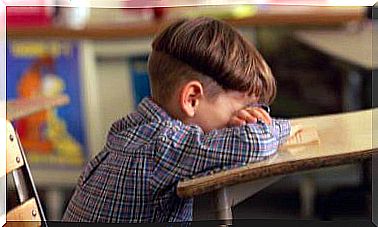The Mistakes Parents Make When A Child Mispronounces

When correcting why a child mispronounces a word, be it due to some physical difficulty or a difficulty of any other kind, we must do so with the intention that this child develops the language in the correct way.
And because? because what we are looking for is that their oral expression is clear, correct and easy to understand. This is very important for the child not only in the short term, but for the rest of his life. If it is not corrected in time, even your personality can be damaged.
The importance of parenting education
Learning language, and all its nuances, is not just the responsibility of school. As parents, we have every responsibility and duty to actively collaborate with our children in all areas. This includes language teaching.
Another important thing to keep in mind is that the fact that a child pronounces badly does not mean that he is bad at school or that he has a mental disability. Many times we tend to magnify the situation.
The way to participate in the learning process is simpler than you might think. In fact, you can start by fostering a love of reading, singing songs, or telling stories out loud.
Although they seem very simple things, they are really very effective when it comes to developing language and accompanying our children.

What NOT to do when a child mispronounces a word
The fact that you do not know how to act when a child mispronounces, will hinder and hinder his behavioral development. These are the most common mistakes to avoid:
- Incorporate the mispronounced word into your everyday language. It is true that when your children learn to speak, there will be words that they cannot pronounce due to lack of lingual coordination. As funny as it may sound, you should correct it so that speaking does not stunt.
- Use diminutives. While you express affection when a child mispronounces, overdoing it so they understand will retard their awareness and normal expressiveness.
- Exclude articles in expressions and ignore prepositions. With this you not only create confusion in learning, but also your grammar can be affected. Remember that this is directly related to what you hear and interpret.
- Don’t show your face in conversations. Spoken language consists of or is nourished by many facial expressions that denote feelings and emotions, and the child learns by model or example. So the fact that you look at him and place yourself at his height, will allow him to copy from you the best way of speaking and pronouncing.
- Don’t substitute correct words for made-up ones. The language must be understandable and call each object, animal or part by its correct name.
What you DO need to do to help them
Your example is very important. Therefore, remember what you must do to help the child learn to express himself well. Take the following steps to help your child:
1. Daily conversation
Try to have daily conversations with the child, even if they last for a few minutes. Strive to create a healthy environment so that the child is comfortable enough to express himself.
This same environment will help you correct it in a clear and constructive way. This will save your child the embarrassment and trauma of making a mistake.

2. Patience
If the child has trouble pronouncing a word, stand in front of him looking calm and pronounce it slowly so that he not only copies the sounds, but also the movement of your tongue and mouth.
In addition to your gestures, ask him to repeat it just two or three times. It will be more than enough for now.
3. Ask a professional for help
If you consider that the mispronunciation problem is due to a physical disability, you will have to go to a professional. He will advise you on how you should act in this regard and what solutions are available.
The mispronunciation may be due to the frenulum, for example. Your child may need to do articulation exercises or wear a special device for a certain amount of time.
4. Spend time
When a child mispronounces, don’t ignore it. Correct the word with a clear and concise pronunciation, looking into his eyes. Remember that you are there to help him, not to punish him.
Sometimes you may unconsciously make mistakes. For example, it is possible that you laugh, because of the grace it causes you, when you hear a certain word mispronounced. This is normal, but try to avoid it if you really want to help him.
Daily effort and confidence will help you to achieve the goal in a satisfactory way. Cheer up!










